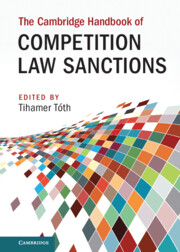Book contents
- The Cambridge Handbook of Competition Law Sanctions
- The Cambridge Handbook of Competition Law Sanctions
- Copyright page
- Contents
- Authors’ Affiliations
- Acknowledgment
- Part I General Chapters
- 1 The Quest to Create an Effective Set of Competition Law Sanctions
- 2 The Role of Fines in the Toolkit of Competition Agencies
- 3 Sanctions on Legal Persons
- 4 The Effectiveness of European Antitrust Fines
- 5 Corporate Governance and Competition Law Sanctions
- 6 Antitrust Criminalization As a Legitimate Deterrent
- 7 Criminalization of Anticompetitive Conducts
- 8 “Consensus”-Based Sanctions and Commitments
- 9 Effectiveness of Commitment Decisions
- 10 Compliance Policies and Sanctions
- 11 The Role of Administrative Courts in the Effective Enforcement of Competition Law Sanctions
- 12 Civil Sanctions in Antitrust Public Enforcement
- 13 What Role for Private Enforcement in EU Competition Law?
- 14 The Insights of Labor Law
- 15 Human Rights Jurisprudence and the Effectiveness of Competition Law Sanction
- 16 Catholic Teaching on Just Punishment, Especially in Connection with Financial Matters: According to the 1983 Code of Canon Law
- Part II Country Reports
6 - Antitrust Criminalization As a Legitimate Deterrent
from Part I - General Chapters
Published online by Cambridge University Press: 29 July 2022
- The Cambridge Handbook of Competition Law Sanctions
- The Cambridge Handbook of Competition Law Sanctions
- Copyright page
- Contents
- Authors’ Affiliations
- Acknowledgment
- Part I General Chapters
- 1 The Quest to Create an Effective Set of Competition Law Sanctions
- 2 The Role of Fines in the Toolkit of Competition Agencies
- 3 Sanctions on Legal Persons
- 4 The Effectiveness of European Antitrust Fines
- 5 Corporate Governance and Competition Law Sanctions
- 6 Antitrust Criminalization As a Legitimate Deterrent
- 7 Criminalization of Anticompetitive Conducts
- 8 “Consensus”-Based Sanctions and Commitments
- 9 Effectiveness of Commitment Decisions
- 10 Compliance Policies and Sanctions
- 11 The Role of Administrative Courts in the Effective Enforcement of Competition Law Sanctions
- 12 Civil Sanctions in Antitrust Public Enforcement
- 13 What Role for Private Enforcement in EU Competition Law?
- 14 The Insights of Labor Law
- 15 Human Rights Jurisprudence and the Effectiveness of Competition Law Sanction
- 16 Catholic Teaching on Just Punishment, Especially in Connection with Financial Matters: According to the 1983 Code of Canon Law
- Part II Country Reports
Summary
The chapter analyses the intersection of competition law enforcement and criminal justice. It sets out the primary theoretical justification for criminal cartel sanctions: (economic) deterrence. Supporters of antitrust criminalisation usually argue that the optimally deterrent cartel fine is too large to be imposed and that a global trend towards criminalisation of cartel activity can be detected at present. What was once primarily a US phenomenon has become international, with countries as diverse as Israel, Brazil and Australia pursuing a policy of cartel criminalisation. This chapter evaluates some of the inherent practical problems with criminal cartel sanctions. It provides insights into how best to ensure that cartel criminalisation improves the effectiveness of a criminalised regime’s competition policy. The chapter comprises two substantive sections. The first outlines the deterrence-based theoretical justification for criminal cartel sanctions. The second critically analyses two important inherent problems that arise when criminal sanctions are used to deter cartel activity: the difficulty of securing efficient competition law enforcement when criminal cartel sanctions are employed; and the need to connect the criminalised cartel activity to morally wrongful behaviour.
Keywords
- Type
- Chapter
- Information
- The Cambridge Handbook of Competition Law Sanctions , pp. 101 - 116Publisher: Cambridge University PressPrint publication year: 2022



